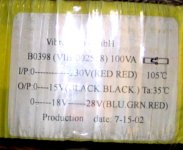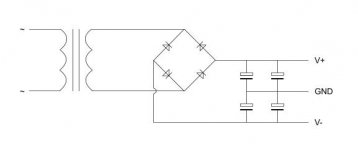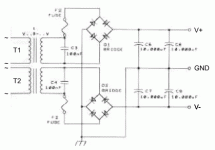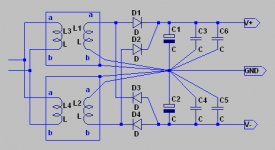I found some 100Va 28Vac Torroids that i would like to use with the UcD180 Modules. According to the information by Hypex 100Va per UcD180 module should be sufficient.
My question is about the ground. I see in the PDF by Hypex http://hypex.nl/docs/UcD180_manual.pdf They connect the ground to the center of the secondary coil of the torroid.
Can this be done with this torroid aswell and is it necessary?
My question is about the ground. I see in the PDF by Hypex http://hypex.nl/docs/UcD180_manual.pdf They connect the ground to the center of the secondary coil of the torroid.
Can this be done with this torroid aswell and is it necessary?
Attachments
Hi,
this transformer doesn't really look appropriate. It's not specifying to be capable of supplying 100VA out of the 28V line! The 100VA total also include the 15V line!
You would need one of those transformers in order to form a single supply rail. As the UCD modules require a dual voltage supply, two transformers are required for both supply rails. The best way would be to make a PSU like with a dual secondary transformer (which yours aren't) and connect the two transformer 28V coils in series, just like the secondaries of one transformer.
But remember that those trafos could likely be too weak to deliver stable voltage to a UCD180.
Cheers,
Sebastian. 😉
this transformer doesn't really look appropriate. It's not specifying to be capable of supplying 100VA out of the 28V line! The 100VA total also include the 15V line!
You would need one of those transformers in order to form a single supply rail. As the UCD modules require a dual voltage supply, two transformers are required for both supply rails. The best way would be to make a PSU like with a dual secondary transformer (which yours aren't) and connect the two transformer 28V coils in series, just like the secondaries of one transformer.
But remember that those trafos could likely be too weak to deliver stable voltage to a UCD180.

Cheers,
Sebastian. 😉
Thank you for your explanation Sebastian, i understand now 2 secondary coils are neccecary for the UcD modules. And it is possible to link 2 of these transformers together in series. I have done some investigation on the transformers and it seems they are capable of handling 100Va on the 28V coils. Since the 15V Rail can only handle about 1Va this is not taken into account by the manufacturer.
I think i will go ahead and make a power supply using these torroids, since the first UcD amp i'll make will be only or testing. Partly because i am new to making amp's and partly because i would like to know what they sound like. If i am able to make a decent sounding (and working!) amp i want to try to make a 5.1 amp using UcD180 modules. Offcourse i will buy some nice dual secondary torroids for that amplifier.
I think i will go ahead and make a power supply using these torroids, since the first UcD amp i'll make will be only or testing. Partly because i am new to making amp's and partly because i would like to know what they sound like. If i am able to make a decent sounding (and working!) amp i want to try to make a 5.1 amp using UcD180 modules. Offcourse i will buy some nice dual secondary torroids for that amplifier.
Actually you don't need dual voltages out of the trans.
i've just built a 180 based amp with only a single 30v voltage. you only need the second voltage if your doing things with the aux part of the amp.
28v seems a bit low though
i've just built a 180 based amp with only a single 30v voltage. you only need the second voltage if your doing things with the aux part of the amp.
28v seems a bit low though
What do you mean by aux part? I really would like to use these torroids. Could you send me a schematic of how you connected it?
sorry i wasn't being very specific. I'm a newbie and don't really understand much
I built my 180 based amp using the HG power supply.
the torroid I bought had only 30v secondaries, a bit like yours.
the guys on the UcD questions thread answered my question here
basically you only need the lower voltage secondaries if you make amendments to the PS. Hypex confirmed this and mine works fine with a 500VA and 30v secondaries.
I built my 180 based amp using the HG power supply.
the torroid I bought had only 30v secondaries, a bit like yours.
the guys on the UcD questions thread answered my question here
basically you only need the lower voltage secondaries if you make amendments to the PS. Hypex confirmed this and mine works fine with a 500VA and 30v secondaries.
Dear iwf. I appreciate your help but i think we arent talking about the same thing. I dont mean a lower voltage secondary (~12v). My torroid only has 1 28V secondary coil, i think your shas 2 31V coils but nu ~12V coil. I know i dont need the lower voltage 1. I just would like to know if it is possible to use this torroid that has only 1 secondary 28V coil instead of 2 (i have 4 of these torroids in total) would it be at all possible to use this with the UcD180?
Hi,
this is possible, but dangerous.
The center potential between the caps, which becomes the ground for the amplifier, has no DC path to the rails, it's noisy and unstable as a reference. With any deviation of the charge between the caps, the ground reference would float around, affecting stability, sound and safety.
Additional resistors (to form a voltage divider) would be better, but they would constantly conduct current and thus waste power.
After all, there's a reason why everybody uses (and recommends) dual or split-secondary transformers (or two single secondary ones like yours)!
Cheers,
Sebastian.
this is possible, but dangerous.

The center potential between the caps, which becomes the ground for the amplifier, has no DC path to the rails, it's noisy and unstable as a reference. With any deviation of the charge between the caps, the ground reference would float around, affecting stability, sound and safety.
Additional resistors (to form a voltage divider) would be better, but they would constantly conduct current and thus waste power.
After all, there's a reason why everybody uses (and recommends) dual or split-secondary transformers (or two single secondary ones like yours)!
Cheers,
Sebastian.
Thank you for your reply (and concern) Sek 🙂 I made a new circuit diagram for the power supply using 2 seperate torroids (i have 6 of these so cost is no object) Would this be a usable design? And if so, wich sides of the secondarys would i have to connect to the top of the rectifiers?
Attachments
I don't think it's a good idea because the phase between the primary and secondary of two torriods might not be the same, and there will be some funny distortion in the power as a result.
soongsc said:I don't think it's a good idea because the phase between the primary and secondary of two torriods might not be the same, and there will be some funny distortion in the power as a result.
THERE NO distortion diffrent in here
and one bridge have low voltage drow down than two bridges
RG
FUMAC
Attachments
If you think it's okay, why even ask?fumac said:
THERE NO distortion diffrent in here
and one bridge have low voltage drow down than two bridges
RG
FUMAC
soongsc said:
If you think it's okay, why even ask?
i have asked nothing🙂🙂
PLS goto 1st🙂
RG
FUMAC
You're right, I must have misread the funny typing.fumac said:
i have asked nothing🙂🙂
PLS goto 1st🙂
RG
FUMAC
😕
Hey guys, 😉
using two rectifier bridges makes you more independent of manufacturing tolerances and unlinearities in the transformers, also the star ground can be wired more easily (as you can place it closer to the amp itself with easy wiring).
Using one rectifier bridge is cheaper and consumes less power (drops less voltage), but you have to care for connecting the two secondary coils in phase (relative to each other) and get a sightly different ground star wiring.
But both are possible and both are used regularly by amp manufacturers, and both grounding options can actually be dealt with.
Cheers,
Sebastian.
using two rectifier bridges makes you more independent of manufacturing tolerances and unlinearities in the transformers, also the star ground can be wired more easily (as you can place it closer to the amp itself with easy wiring).
Using one rectifier bridge is cheaper and consumes less power (drops less voltage), but you have to care for connecting the two secondary coils in phase (relative to each other) and get a sightly different ground star wiring.
But both are possible and both are used regularly by amp manufacturers, and both grounding options can actually be dealt with.
Cheers,
Sebastian.
sek said:Hey guys, 😉
using two rectifier bridges makes you more independent of manufacturing tolerances and unlinearities in the transformers, also the star ground can be wired more easily (as you can place it closer to the amp itself with easy wiring).
Using one rectifier bridge is cheaper and consumes less power (drops less voltage), but you have to care for connecting the two secondary coils in phase (relative to each other) and get a sightly different ground star wiring.
But both are possible and both are used regularly by amp manufacturers, and both grounding options can actually be dealt with.
Cheers,
Sebastian.
Agree.😉 But also care should be taken to not use individual secondary windings like centertapped windings.
I think i will go for dual Rectifiers, from what i have read on the forums it seems be beneficial to the sound. I will also make a circuit diagram using 2 torroids and one rectifier. Thank you all for your help so far!
- Status
- Not open for further replies.
- Home
- Amplifiers
- Class D
- Torroid for UCD180 Module



